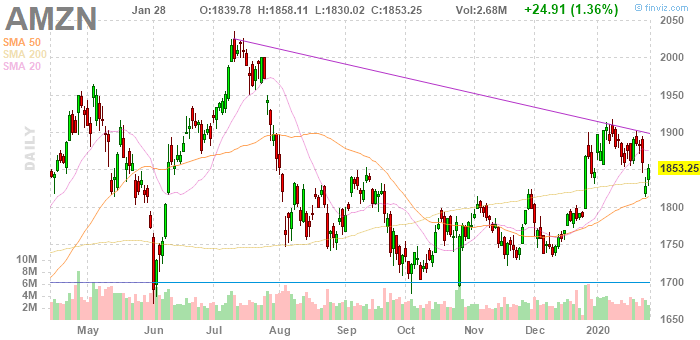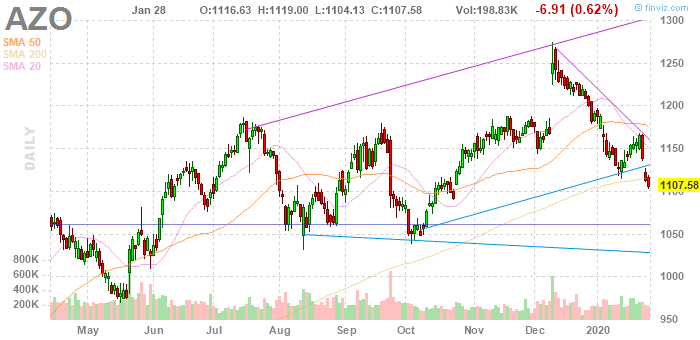U.S. stocks came roaring back on Tuesday. Sell-offs in the two previous sessions either were driven by fears of the coronavirus — or, in retrospect, perhaps by investors simply looking for a reason to sell in a market at all-time highs.
Whatever the cause, those same investors quickly bought the dip on Tuesday. The S&P 500 rose exactly 1%, and the NASDAQ Composite gained 1.43%.
It remains to be seen in which the direction the market heads from here, but it’s worth noting that volatility has picked up tremendously in the three sessions. Since Nov. 1, the S&P 500 had moved more than 0.9% in a single session just once. The index has done so in each of the last three trading days.
Wednesday’s big stock charts feature three names which could face near-term volatility of their own. All three stocks look set to make a move. Those moves could be even bigger if broad market volatility is here to stay.
Amazon.com (AMZN)
The ability of Amazon (NASDAQ:AMZN) to defy gravity has faded. Over the past eighteen months, AMZN stock has gained just 2.3%, dramatically underperforming the 24.6% rise in the NASDAQ 100.
Shares have rallied in recent months, but ahead of earnings on Thursday afternoon there’s a case for downside:
- Most notably, AMZN stock has established an inverted cup-and-handle pattern. That pattern would break if AMZN can gain into earnings, and the bounce off the 50-day moving average on Monday and the 200DMA Tuesday does suggest that could happen. But a longer-term descending triangle — another bearish pattern — adds to the sense of caution here.
- Meanwhile, the earnings report doesn’t necessarily look like the positive catalyst past releases have provided. AMZN dipped sharply after the Q3 report in October, though it recovered quickly. The second quarter report led to a steep decline. Both broader trading and near-term responses to earnings suggest that investors aren’t quite as forgiving as they’ve been in the past.
- And so near-term trading may well be determined by how the market reacts to the fourth quarter release on Thursday. The core determinant there could be the company’s detail on its one-day shipping policy. Guidance for higher spend behind that effort led to the July decline and Amazon has guided for a stunning $1.5 billion impact on fourth quarter profit. That’s one reason why I suggested earlier this month that investors fade the rally in Amazon stock; the chart heading into earnings is another.
AutoZone (AZO)
AutoZone (NYSE:AZO) already delivered an earnings beat in early December, which sent AZO stock to an all-time high. Since then, however, shares have headed in the wrong direction, and the second of Wednesday’s big stock charts suggests that could continue:
- The declines in the last three sessions have pushed AZO out of both an uptrend and a triangle pattern. Those moves suggest near-term downside. A dip below the 200-day moving average leaves no support on the chart before the next key level around $1,055, an incremental downside of nearly 5%.
- Sector pressure is playing a role. As predicted in our big stock charts on Dec. 6, Advance Auto Parts (NYSE:AAP) managed to find support but it’s already declined 13.5% in 2020 to a nearly five-month low. O’Reilly Automotive (NASDAQ:ORLY) has faded as well, if more modestly. Whether it’s fear of online competitors like Amazon, or a response to significant rallies in all three stocks, investors are selling auto parts retailers.
- Earnings reports from O’Reilly and Advance in the first half of February could reverse that sentiment, and give AutoZone stock a boost. But given that AZO couldn’t catch a bid even on a green day for the markets, the sell-off could continue until then.
A.O. Smith (AOS)
A.O. Smith (NYSE:AOS) desperately needed a bounce and a 3.8% gain on Tuesday certainly qualifies. The third of our big stock charts still looks worrisome, but there’s a logic to Tuesday’s buying:
- The chart still suggests cause for concern. Like AZO, AOS stock exited both a triangle pattern and a broader uptrend from late May lows. The 50-day and 200-day moving averages are converging as well, creating the potential for a so-called “death cross.” Heavy volume in January would add meaning to that cross, should it play out in coming sessions.
- The recent pressure on a manufacturer of water heaters, boilers, and water treatment products might seem surprising. But China is a key market for A.O. Smith and the company’s fourth quarter report on Tuesday shows its importance. Revenue from China declined 23% in 2019, due in large part to macro effects from the trade war. As a result, total sales dropped 6% for the year. Earnings per share in the fourth quarter declined 24%.
- And so the near-term direction of AOS stock will be determined by how investors view the fourth quarter report in the context of the broader outlook. Is Tuesday’s gain a sign that investors will stay patient? Or is it just a “dead cat bounce?”
As of this writing, Vince Martin has no positions in any securities mentioned.



